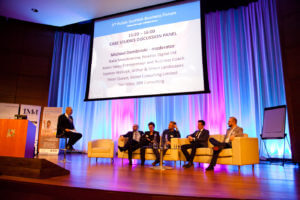
On 23 November 2017, Pblink.co.uk held its third Polish Scottish Business Forum, at the RBS Conference Centre in Gogarburn, Edinburgh. Bringing together Polish and Scottish entrepreneurs and business support services, the event was an opportunity to learn, exchange experiences and insights and network.
As in previous years, the focus was on the practical aspects of running and growing a business, although five years after the launch of Pblink.co.uk, many of the Polish firms present in Scotland have grown accustomed to the local business environment. Sustainable growth was very much on the agenda, as business owners girded themselves for the challenges that lay ahead – not least Brexit.
All ready for @pb_link #BizForumPL #Edinburgh RBS Gogarburn. GREAT day ahead pic.twitter.com/L9AB6KHwL3
— Colin McKeand (@ColinMcKeand) 23 November 2017
The forum partners were Royal Bank of Scotland (RBS), which hosted the event, Gillespie Macandrew, Sami Swoi/One Money Mail and WorldPay; the Forum’s supporters were BC Printing, HR Department, Magic Blinds, KIK Engineering, Neandoo, Emito and Magazyn Square. A significant feature of this event was that the split of participants between those originally from Poland and those hailing from elsewhere was 50:50, showing that the Polish entrepreneur community is opening up into the diversity of the UK business ecosystem.
After opening words of welcome from Ireneusz Truszkowski, the Polish consul general in Edinburgh, Paweł Mes, founder and owner of One Money Mail and Bartek Kowalczyk of Pblink.co.uk, Evan Dunn from RBS Business Growth Enabler talked about the role of modern banking in the process of growing a business. Mr Dunn made the point that the average Briton has but £5 in cash about their person, so any business that has not made the transition to cashless payment is losing out.
Mike Reynolds of Integris Communications gave a practical overview of how public relations works – how to get noticed by the media, how to write press releases that the media will use and how to work with journalists to gain maximum positive coverage for your business. A hot topic these days across the UK and Poland is the EU’s General Data Protection Regulation (GDPR) which comes into force next May. Annie Carr of law firm Gillespie Macandrew pointed out that UK businesses holding data on EU citizens after Brexit will still fall under the scope of the GDPR even in the eventuality of a hard Brexit. There were more questions from the audience about what GDPR means to their businesses than on all the other subjects covered on the day put together!

Serial entrepreneur and business coach Karen Yates gave some useful pointers about how to build ‘expert status’ for yourself so that people would naturally come to you for your business services. The process of establishing a niche can be done quickly if a focused approach is taken, she said, giving some practical examples based on her own experiences of setting up businesses in new locations.
After a lunch break during which there were two workshops, one on photography for business by Claire Watson, and one on the skills of following-up by expert networker Colin McKeand, it was time for a packed afternoon session.
LinkedIn expert Miles Duncan gave a fascinating presentation explaining how to use this social media platform to make the most of its potential. With 23 million people in the UK on LinkedIn, it has amazing reach, though few people know how to use it properly. Mr Duncan gave a step-by-step guide to LinkedIn’s various features, but said that the most important key is not to try to sell yourself, but rather to showcase the solutions you can bring to solve other people’s business problems. Tim Hiller of SBR Consulting, focused on sales, sales management, and how to motivate a sales team. By peeling a banana from the non-stalk end, he showed how counter-intuitive thinking allows us to break out of established habits – and the same goes for the sales process.

Jonathan Knott, British Ambassador to Warsaw, talked to the audience comprising mainly of business owners about the future of trade between Poland and Scotland (and indeed the entire United Kingdom) in the light of Brexit. Mr Knott remained for the rest of the session and during the afternoon coffee break was on hand to answer individual questions face to face. Peter Queen of Geisel Consulting presented an introduction to business collaboration – how entrepreneurs can collaborate with other businesses, either horizontally or vertically (in the supply chain). Mr Queen pointed out that by being open to such partnerships, both sides have much to gain if what they offer one another is complementary.

The final presentation was from Ian Hogg of Ritchie Hogg M&A Consulting, who talked about the business of buying and selling of businesses. Starting off by showing examples of real businesses currently on sale by their owners, Mr Hogg explained the benefits – and indeed the pitfalls – of growing your business through acquisition. “Success boils down to just two things – doing the right deal, and doing the deal right,” he said. Mr Hogg also covered the process of selling a business, something that every business owner should keep somewhere in the back of their mind, even if they have no immediate plans to quit, building value into a business so that it can be readily sold will help realise the best price.
After the coffee break, participants returned for the discussion panel, in which Ms Yeats, Mr Queen and Mr Hiller were joined by two Polish entrepreneurs, Rafał Moszkowców of Neadoo Digital and Szymon Królczyk of Arthur and Simon Landscapes. The panel session, moderated by BPCC chief advisor Michael Dembinski, centred around cultural differences that could be observed in the style of business leadership between Poland and the UK. Questions of team work vs. deep work, sales force management, the importance of building trust in business relationships, and openness to networking were among the subjects covered.
The business networking session began with everyone briefly introducing themselves and their businesses, then engaging in swapping business cards and building new business contacts which hopefully will lead to more customers and higher turnover! Year on year, Polish business owners in Scotland are becoming more confident, more experienced and as their businesses grow, so their contribution to the Scottish economy becomes more significant.



